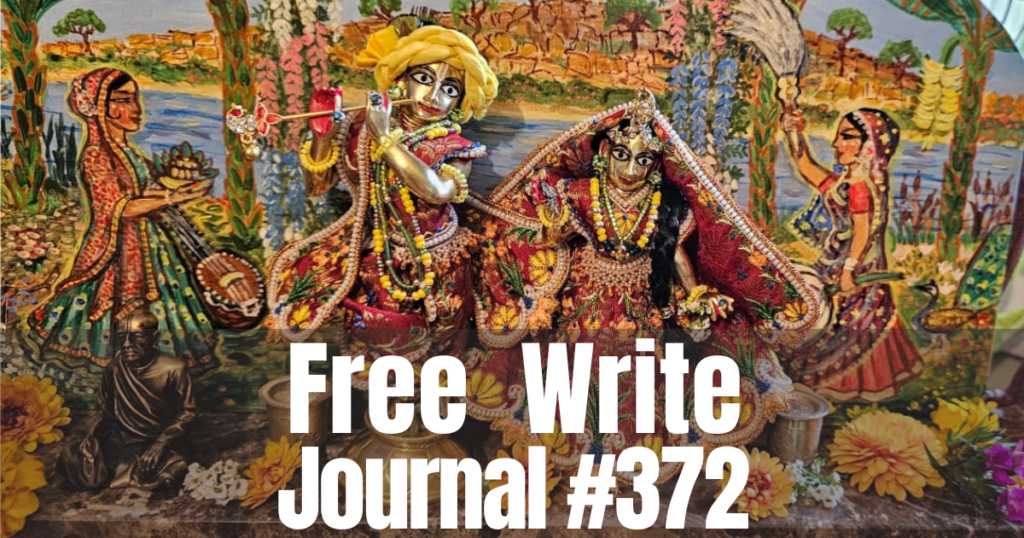
Vyasa Puja Birthday Celebration of H.H. Satsvarupa dasa Goswami
Stuyvesant Falls Fire Department upstairs banquet hall 9 Firehouse Ln, Stuyvesant Falls, NY 12174
The Stuyvesant Falls Fire Department is located directly behind the Viraha Bhavan ashram buildings. The parking is the same as you would park when visiting Viraha Bhavan (909 Albany Avenue)
10:00 – 10:30 A.M. Kirtana
10:30 – 11:15 A.M. Presentation by Satsvarupa Maharaja
11:15 – 12:30 P.M. Book Table
12:30 – 1:15 P.M. Arati and kirtana
1:15 — 2:15 P.M. Prasadam Feast
Baladeva Vidyabhusana at [email protected] or (518) 754-1108
Krsna dasi at [email protected] or (518) 822-7636
“I request as many devotees as possible to attend so we can feel the family spirit strongly. I become very satisfied when we are all gathered together.”
******
“In the association of pure devotees, discussion of the pastimes and activities of the Supreme Personality of Godhead is very pleasing and satisfying to the ear and the heart. By cultivating such knowledge one gradually becomes advanced on the path of liberation, and thereafter he is freed, and his attraction becomes fixed. Then real devotion and devotional service begin.”
“The process of advancing in Kṛṣṇa consciousness and devotional service is described here. The first point is that one must seek the association of persons who are Kṛṣṇa conscious and who engage in devotional service. Without such association one cannot make advancement. Simply by theoretical knowledge or study one cannot make any appreciable advancement. One must give up the association of materialistic persons and seek the association of devotees because without the association of devotees one cannot understand the activities of the Lord….. One who has firm faith in the Supreme Personality of Godhead becomes fixed, and his attraction for association with the Lord and the devotees increases. Association with devotees means association with the Lord. The devotee who makes this association develops the consciousness for rendering service to the Lord, and then, being situated in the transcendental position of devotional service, he gradually becomes perfect.”
— Srimad-Bhagavatam 3.25.25, verse and purport
“Satsvarupa Maharaja’s health has been erratic for several months in terms of head pain, “sundown syndrome,” tiredness and other indicators. His various old age pains are getting more prominent, but the standard reaction is, “We are tolerant.” The chiropractor comes twice a week with some success, but his diagnosis is standard for most physiotherapists and others: “Not enough exercise, too much chair time.” Still the writing goes on almost daily, and new books will be available on Vyasa Puja day. Another exciting addition is video interviews: he’s speaking on video about various individual books that are important to him.”
Hari Hari,
Baladeva
We need to expand our team of proofreaders as we aim to increase the rate of republication of Satsvarūpa Mahārāja’s books as well as new books that he writes.
This includes a need for fluent bilingual Spanish and English speakers to proofread Spanish translations (we currently have around 20 Spanish translations waiting to be proofread).
Anyone interested in this particular service should contact Manohara dāsa at [email protected]
If you would like to help, please contact Kṛṣṇa-bhajana dāsa at [email protected] or [email protected] and we will find you a service that utilizes your talents.
108 beads in a loop around his head. Merry, safe japa is the best way to go. We are on a week-long vrata and so far so good. We invite you to join us sometime. Seems a great way to associate and help others, get a secluded house and turn on some friends.
******
Last night, Madhu read us a prayer he wrote asking Panca-tattva to allow him to improve his japa. It was simple and direct, asking for what we all want. He has a tendency to express prayers, and that is nice. Petitions are good when we ask the Lord and His representatives to help us in our sadhana, our service, our ability to preach. We need help.
******
Now the upcoming challenge will be how much of this consciousness we can continue after our week is up. Our quota will go down to sixteen. Or can we keep a little increase? Can we stay above that offensive level of deliberate inattentive chanting where we mull over and live in our thoughts with the japa a mere background noise? I hope that there will be a continued improvement in my case.
******
I’m not an all-out lover of the holy names. But I do understand it is the most important (Prabhupada and the sastras say so) and it is the easiest access to love of God. Who but a stubborn fool will avoid it?
******
This morning I deliberately indulged in feverish literary planmaking while chanting japa. I’m guilty of it. I saw it happening and I said, “Well, all right, let me do it, these ideas are coming, I need to write them down. I’ve been waiting for these ideas and now they’ve finally come for a next book. Anyway, this is service too, to Krsna.” Typical rationalizations that I make. So nevertheless, I’m going on with the sixty-four round vrata and I’m not so far behind schedule. But I just wanted to admit that here on the morning walk.
******
How do you go about living one day at a time? Consider the goal of this one. Chant sixty-four rounds. Isn’t that enough? Yes, and when the mind dwells too much on the past or future, return it here. Right here today on the rounds, on this round, on this bead and mantra. Your left fist is closed, naturally. Unclench it and soon it returns to clench.
******
Krsna says He is obliged to one who calls on His name, as did Draupadi when she cried, “He Govinda!” His attention goes to the sincere chanting. I am there where they chant My names, He says. “Narada penetrates into the presence of the Lord by the transcendental chant.”
******
We want to live alone, me and my sub-parts. Not always, but we want to live without that social pressure. We (me and sub-parts) say we can function better that way to serve others. Write, and now this week, this day, dedicate to chant and hear the chant. Walk around the house and sit here and there, chanting, make a sound you can hear, go on chanting. Hare Krsna Hare Krsna, Krsna Krsna. What is the nature of Hare Krsna? To whom is it addressed? Who told you to chant? Why do you chant? How does this fulfill the purpose of life?
******
Do you pray when you chant? Can you please try to do it? Lord Caitanya gives you a simple task; not too much penance. It’s not a foreboding thing to utter His names. You can do it at your ease in this secluded “mark cottage” on the Scottish coast, with friends. Gain conviction to spread the chanting. The results of this vrata you could speak to others but I’m not sure in what form. Sri-krsna-caitanya prabhu nityananda sri-advaita . . All glories to the Lord of the universe.
pp. 22-25
‘duḥkha-madhye kona duḥkha haya gurutara?’
‘kṛṣṇa-bhakta-viraha vinā duḥkha nāhi dekhi para’Śrī Caitanya Mahāprabhu asked, “Of all kinds of distress, what is the most painful?”
Śrī Rāmānanda Rāya replied, “Apart from separation from the devotee of Kṛṣṇa, I know of no unbearable unhappiness.”
—Sri Caitanya-caritamrta, Madhya 8.248
In the Fourth Canto of Srimad-Bhagavatam, Srila Prabhupada explains that the disciple is supposed to cry after the disappearance of the spiritual master. He also describes how the disciple is supposed to get solace from the Supersoul, take up the instructions of the spiritual master, and in that way become Krsna conscious. As far as separation from Krsna or separation from the devotee is concerned, it’s the most exalted part of our philosophy. When you start your spiritual life you learn, “I am not this body,” — and then you go on to different ideas. Finally, you begin to understand the intimate relationships between the devotee and God. And the highest stage of spiritual realization is to understand conjugal love of God and the feelings of separation. But although this is the highest level of spiritual understanding, the same principle applies in our present situation also. So we should understand the Vaisnava philosophy of separation.
According to today’s verse, the worst kind of unhappiness is separation from a devotee. One way to understand this is in reference to the unfortunate person who, by his own foolishness, cuts himself off from the devotees—not only from the spiritual master, but from his own Godbrothers, or fellow disciples. Such a person finds himself in a very unhappy condition. He thinks he will become happy by leaving the association of devotees; but if he’s actually a devotee, even though he’s trying not to be one, he’ll be very unhappy outside the association of devotees. The best devotee is the spiritual master, the pure devotee, and his passing away is the greatest pain, but the solace is that now, more than ever, we have to associate with the other devotees.
Now our spiritual master, the leader of all the other devotees, is gone. Are we then like any army that has lost its commander-in-chief? Is the spiritual master like the chief ksatriya, upon whose death the whole army is considered defeated? Sometimes with packs of animals, if you defeat the leader animal, the whole pack is defeated and they run away. Is it like that with us? No, definitely not. In spiritual life, the guru trains his disciples in such a way that after his departure they don’t even feel that they have lost their leader. But if there is no devotee in the world, then, Ramananda Raya said, “This is the most unhappy condition.” If for some reason you are cut off from the devotees—maybe it came about through your own foolishness or by the arrangement of karma—then you will experience the greatest despair. We should not minimize the importance of associating with each other. We have lost the physical presence of the greatest devotee, and now more than ever we should appreciate even the so-called minor devotees.
Someone may think, “I would like to associate with Prabhupada, but now there is no such exalted devotee!” Yes, but Prabhupada’s disciples are devotees! If you think that these devotees are not suitable for you and you want to do without any association, then you will experience the worst unhappiness. You should stay in the association of devotees. Any person who doesn’t worship Krsna, who is too attached to his family, who doesn’t stick to devotional service, who doesn’t associate with devotees, and who doesn’t render service to a superior—he is most unhappy.
On the spiritual platform, the unhappiness of separation is a different kind of unhappiness.
“The great devotee Uddhava once wrote a letter to Krsna: ‘My dear Krsna, I have just finished a study of all kinds of philosophical books and Vedic verses about the goal of life, and so now I have a little reputation for my studies. But still, in spite of my reputation, my knowledge is condemned, because although enjoying the effulgence of Vedic knowledge, I could not appreciate the effulgence emanating from the nails of Your toes. Therefore, the sooner my pride and Vedic knowledge are finished the better it will be.” (NOD 38)
When the spiritual master leaves, all the disciples—whether they were connected with him personally or not —will probably feel that they did not take full advantage of his presence. This feeling that one hasn’t really lived up to expectations in the most important matter of being attached to the pure devotee is pointed out here. What good are the things that you somehow gain—expertise in learning the verses of Bhagavad-gita, or playing musical instruments, or even in distributing Srila Prabhupada’s books? What good is it if you never become attached to Prabhupada, either through his books or through his personal association in different ways? In the passage I have just read, Uddhava was saying, “I don’t have any attachment for the effulgence from the toes of Krsna.” Because he feels he hasn’t developed a personal attachment for Lord Krsna, he is indifferent towards anything else. But this is also purifying—the feeling that “If I fail to reach You, what good is anything else?”
Then we find another sentiment. A devotee anxiously expressed himself in this way: “My mind is very flickering, and I cannot concentrate upon Your lotus feet. Seeing this inefficiency in myself, I become ashamed. The whole night I am unable to sleep, because I am exasperated by my great inability.” This is another purifying devotional sentiment. We should try to think of Krsna and Srila Prabhupada. It’s not that thinking of Prabhupada has stopped, any more than thinking of Krsna has stopped. Actually, we should think even more of our spiritual master now. Yet here the devotee is saying, “That might be. I know I should. But I can’t. I can’t think of him. I can’t think of Krsna.” Just as Lord Caitanya said, “I don’t have any taste for this chanting.” But rather than just being dull about it, the devotee wants to feel the keen regret of being so stupid—being so, as he says, inefficient. He becomes ashamed.
We should aspire for this feeling of regret. Narottama das Thakura prays, “I don’t like the devotees, I don’t like the sankirtana movement. I don’t like the chanting of Hare Krsna.” But that very dislike of Krsna consciousness—if that makes me feel ashamed — well, that’s good. At least I am a devotee in that I am very unhappy that I am not much of a devotee. So although this devotee in The Nectar of Devotion is so exasperated, it is to his credit.
Feeling regret is the same as feeling very happy and satisfied to live in the temple, take prasada, and be jolly and cheerful. This regret is just the other side of that happiness. It’s another variety in spiritual life. These sentiments aren’t material, and such a person is actually a devotee of a high standard.
pp. 279-82
You wanted the land for Krishna,
and at first it seemed easy enough—
a paradise spot in Juhu Beach,
acres with palm trees,
tourist traffic,
pleasant sea breezes,
and your vision
for a gorgeous temple and hotel.
Mr. N. gave a good price,
and you took it,
although there were suspicions
and your own disciples
saw the land as jungle
—they had no building!
There were hardships,
mosquitoes, rats, brush
and tall grass to clear,
and you stayed in a tent.
Anticipating a landlord’s snag,
you took a bold step
to assure possession,
bringing the Deities
to be worshiped in a tent
that swayed in the wind.
This is not easy to understand.
Rasabihari was your Lord,
and you were the humble
servant of Radharani.
Yet you invited Them
to come right away.
Krishna would establish
His own proprietorship.
Fervently you prayed,
“My dear Sir, please remain here,
and I shall build a beautiful temple
for You.”
No devotee wanted to take charge,
until you appointed Giriraja.
Then you resumed your world travels.
But wherever you went,
you worried over Bombay.
And there was cause:
where was the deed?
Months had gone by,
and Mr. N. had withheld.
He had your downpayment—
and you had the land.
You telegrammed from L.A.,
“Get the conveyance,”
but Giriraja wrote back
with complications—
new taxes, new payments
put forward by Mr. N.,
and no deed.
From London,
another telegram:
“Finish immediately.”
Giriraja tried on your command,
but Mr. N. applied another knot:
“You never got permission
from the Charity Commission.”
Wherever you traveled, you carried
the burden. In New Yrindaban
or Dallas Gurukula, the devotees
hardly knew what was on
your mind; more telegrams
to Bombay were of no avail.
You sent more leaders
to join Giriraja:
“I cannot tax my brain
from such distant places.”
Then a letter from your lawyer
—he had resigned.
You saw him as a cheater
in league with Mr. N.
“Let us fight,” you decided,
“take them to the court.”
Now in open battle
Mr. N. shut off the water
and sent a hoodlum
brandishing a knife.
Your leaders in Bombay
decided to abandon
and informed you by mail.
“You are too timid,” you replied,
and your order was
to press a criminal charge.
“Do not be afraid.”
In Hyderabad you met
and convinced Mr. N.
with a new sales agreement.
When still he delayed,
your disciples in Bombay
cancelled all agreements
and agreed to quit the land.
“I shall be the last man,”
you declared,
“to give up Hare Krishna Land
to the rogue Mr. N.”
Tempers flared
between you and Mr. N.
in a personal encounter.
You said, either take our money
and leave us alone,
or return our downpayment.
He did neither,
but cursed the devotees
as CIA spies.
Threatening to destroy the temple
and remove the Deities,
he stormed out of the room.
Two weeks later,
after a severe heart attack,
he died.
Mrs. N. and her lawyers
recommenced the fight.
Demolition of a Krishna temple
was scandalous for India,
but they almost succeeded.
By her order
police officials
arrested the devotees
and one hundred demolitionists
with hammers and torches
dismantled the pillars
and tore off half the roof,
approaching the inner room
of Radha-Rasabihari.
Not a minute too soon,
influential Hindu friends
intervened.
Demolition was
a great reverse,
but you turned it
in your favor.
You organized a protest
and got permission
to rebuild. Mrs. N.
was running out of steam.
Her demolition was unpopular,
and she went to you,
bursting into tears.
“Don’t worry,” you said.
“You are just like my daughter.”
In a straw and bamboo cottage
Mrs. N. signed the deed,
and the land was legally ISKCON’s.
Serving a feast for guests,
you described your plans
for a large temple and hotel.
Then leaning back, you exclaimed,
“It was a good fight!”
pp. 16-22
Swamiji used to sit with us in the morning and say, “Chant one round.” Then he would give us a japa lesson.
We didn’t have beadbags in those days, and when we chanted together, Swamiji took his beads out of his bag and held them in his hands. We hung our beads around our necks as we chanted. We wore them out on the street too. Those red beads became the mark of the Hare Krsna chanters.
In his lectures he implored the audience to chant. He promised peace and prosperity, and he assured us it didn’t cost anything. He begged us to chant the holy name because Krsna is nondifferent from His name. He told us we could chant anywhere—in the factory, in the subway, in hell. How could we have chanted without Swamiji’s japa lessons? He was happy to give them to us. More than anything, he wanted us to chant. This is how he hoped to satisfy his guru and all the acaryas. It had to start with us practicing sadhana.
This is a devotional picture of me looking at Srila Prabhupada. I was surprised when I drew it because I saw myself suddenly fifty-five years old—wearing glasses, my lips sunken, wrinkles—sitting in front of Prabhupada. I was only thirty-seven when he left. He has never seen me in this older body. Therefore, I was surprised when this drawing manifested itself. It made me realize how drawings can create their own life, a new possibility in my relationship with Prabhupada.
In this painting, Prabhupada looks like a murti, his skin golden. He’s not looking at me. He seems absorbed in his kirtana. Or perhaps he is looking past me at the assembly of devotees. That’s the freedom of artwork, that you can place yourself right in front of your gurudeva, intent on getting his mercy, looking up to him with worshipful eyes, trying to penetrate his solemnity, his peace, and become absorbed in it.
I superimposed this drawing over Prabhupada’s pranama-mantras because that’s how I worship Prabhupada. I have placed this painting first because my love for Prabhupada is the beginning and essence of my spiritual life. Devotees sometimes ask why I put so much of myself in my writing (and drawing). What can I say? I exist. Prabhupada told me that the feeling that “I am something” is not wrong. I simply have to understand who I actually am. Then he taught me that I was Krsna’s eternal servant. Although I exist in a false conception, I exist in a real conception too. Here I have portrayed myself wearing tilaka, growing old, still trying to respond to Prabhupada’s drawing me to him. Submission to Prabhupada is not a manifestation of false ego, but of Prabhupada’s mercy. Therefore, this is not a drawing of my false ego, but of a person about to serve, who first comes before his spiritual master to beg permission and acceptance. Besides that, Prabhupada liked to see me. He liked to see all his disciples. He didn’t think we were ugly because he could see past the body to the soul. He was interested not in our expertise, but in our hearts. I offer this little book as service to him.
This is my rendition of the cover of a pamphlet Prabhupada brought with him to America. He intended it as both an advertisement and a preaching tool.
Prabhupada used his passport photo on the cover. That photo used to frighten me. He didn’t seem particularly friendly in the photo, but grave, like no one I knew.
Prabhupada didn’t seem masculine or feminine to me. He had attributes of both somehow. His beauty was not of this world.
In those days, I was still bound by style. Swamiji didn’t conform to style, not even to “swami” style. He was from another frame of reference completely. The other swamis we knew had long beards and magnetic smiles. Prabhupada’s gravity was impenetrable. It was clear that he had access to things incomprehensible to us. He could introduce us to Krsna’s world, to “India’s message of peace and goodwill.”
My drawing doesn’t show all that—it’s more like a postage stamp version of the original—but you get the idea.
The ecstatic chanters with Swamiji come partly from my imagination and partly from typical characters of those times. Hayagriva has his beard and saffron dhoti, and it’s likely that the guy with the glasses who is studying Prabhupada is on drugs. Swamiji surrounded by wild Americans. At least there’s a good kirtana going on. The painting is crude because the people were crude. Prabhupada refined us little by little.
Whenever I draw Swamiji, I’m pleased to remember the simplicity and innocence of those days. Would I like to go back to those days? Perhaps I am holding onto some romantic conception of myself and my relationship with Prabhupada. I had so many material desires then. I must be in better shape now. But those days were full of freshness of hope and faith.
I wouldn’t really want to go back, at least not as I am now. That gives this art-remembrance a right to exist. Although it doesn’t exactly bring us back, it evokes the Krsna conscious spirit we had in 1966. Krsna consciousness in New York City. I was there! Swamiji was there! It happened, by Krsna’s grace.
Looks like Kirtanananda there—solemn, dark face, a happy face. We were each absorbed in our own fantasies. Swamiji told us, “Get up and dance.”
I call this painting “With the Swami in the Temple” because that’s where I want to be, at least in spirit. The spirit of 26 Second Avenue was summed up by Prabhupada: “These boys, you will see that they are practically thinking of Krsna twenty-four hours a day. We have so many engagements. We have manufactured engagements. Someone is typing, someone is editing, someone is writing, someone is distributing or dispatching, someone is cooking.” I don’t know whether we really can ever go back, but ultimately, that “going back” means returning to the spiritual world. That is the meaning of 26 Second Avenue.
pp. 41-45
Prabhupāda’s grasp of Kṛṣṇa knowledge was clear and evident, but to speak to him was not always easy. Because of language differences, some of the boys who spent more time with him, such as Keith [Kīrtanānanda], would have to help the others who could not communicate properly with Prabhupāda. But language was only part of it. If we said something with a roundabout preamble he would say, “What?” or “Hmmm?” We had to speak clearly and simply and make good inquiries. We could never use slang or repeat trite phrases like, “You know, you know” and expect him to sustain us out of politeness. We felt impelled to approach Prabhupāda as a spiritual master and ask him serious, philosophical questions.
Bit by bit I got a chance to express different doubts and make inquiries that were personally important to me. One evening I asked Śrīla Prabhupāda, “There are different writers like Nietzsche and others who have actually misled people. Now I can understand that they have terribly misled people. Their evocations are powerful, and they try to be honest, but they express a miserable point of view. Do they have any God consciousness?”
Prabhupāda said, “Their sincerity is their God consciousness.” What he said was important to me. If he had said, “Oh they’re rascals, they’re fools, they’re completely worthless, they’re just going to hell”—that would have been hard for me to take because of my attachment. Instead, he expertly weaned me away from them by giving them credit, even though they remained in darkness and were pitiable persons. Prabhupāda explained that at least they were trying to look for the truth; they weren’t trying to enjoy anything. Still, they were ignorant, addicted to mental speculation. In this way I was able to make the inevitable break from thinkers who had greatly influenced me, and at the same time I retained compassionate regard for their lives of dedication.
Another time when I arrived too late for the general lunch, Prabhupāda again served me separately. While I was taking dāl and capātīs in his presence, I expressed to him how much I liked the prasādam and that I particularly liked to break up the pieces of my capātī and put them in my dāl.
“Oh, you do?” Prabhupāda said, smiling and seemingly surprised, as if he was interested in such a trivial habit. One advantage we had in those days was that there were only a few devotees, and Prabhupāda was able to pay each of us much attention. At least in my case, I cannot see how I could possibly have become attached to Kṛṣṇa without Prabhupāda’s personal cultivation. Who else would have been able to see in my enthusiasm for eating dāl and capātīs a spark of love of God? Who else could have assured me and led me on?
One morning, after Prabhupāda’s class was over, I went outside the temple and sat on the curb, looking down Second Avenue, wondering what I would do. It was Sunday, and I did not have to work at the welfare office, but at the same time I wasn’t committed to spend all my time on Prabhupāda’s behalf. Prabhupāda was still in the storefront talking to some boys. From the window he must have seen me sitting on the curb, because he asked someone to come and get me. I was pleased to hear that Prabhupāda wanted to see me, and I went inside. He was still sitting on his dais, and said, “We are having a feast, and I am inviting you to come this afternoon. Do you have any engagement of work, or can you come?”
“No,” I said, “today is Sunday. I can come.” I had heard indirectly that they were having a feast, but I thought it was just for insiders. In the beginning, I had also thought that morning classes were just for insiders, so I didn’t attend for weeks. But when Prabhupāda personally invited me to the feast, I was happy to come. If he had not personally picked me out of the gutter, I would not have come to the feast on my own.
Śrīla Prabhupāda personally cooked and served us the Sunday feast preparations. We sat in rows in his upstairs room, and he walked up and down the lines barefoot, spooning prasādam onto our plates from different pots. He asked which preparations we wanted, and then served us with pleasure. These preparations were not the same as those we ate at the regular luncheon, but sweets and savories with special tastes. The best preparation that day was his sweet rice. Even after we took full plates, Prabhupāda came back and asked us to take more. He stopped in front of me. Would I like some more sweet rice? In my early spiritual life, I had the misconception that I should deny myself what I liked best. I asked instead for some more plain rice. But even that plain rice, was fancy yellow rice with cheese balls.
pp. 33-37
O Prabhupada, whose pastimes and mission continue in this world, even though he has gone to rejoin the nitya-lila-pravista (eternal lila) of Lord Krsna;
O Prabhupada, who lives on in this world and inspires new followers to distribute his books;
O Srila Prabhupada, who continues to chant japa with his followers, and who continues to speak with his own style of delivery in Srimad-Bhagavatam lectures for future generations, may they carefully listen and understand you;
O Srila Prabhupada, who always declaimed against demons, just as Sri Krsna did, who attacked the Mayavadis because Sri Krsna wanted that, and who attacked karmis with the words of Sri Krsna such as “mudha,” “asses and cows,” “no better than cats and dogs”;
O Prabhupada, who said that out of the nine types of devotional service (beginning with sravanam kirtanam) one can practice a few of them or even one and still attain complete perfection in Krsna consciousness;
O Prabhupada, who wanted restaurants managed by devotees, college professors as devotees, politicians as devotees, artists as devotees, mothers and fathers as devotees, fighters and peacemakers, all as devotees, and who encouraged everyone according to their own inclination and inspiration, as long as they submit to Vaisnava behavior;
O Prabhupada, who said, “I shall request even the drunkards to think of Krsna when they drink wine, because Krsna says He is the taste of liquid!”
O Prabhupada, who did the impossible to spread Lord Caitanya’s movement, but who sometimes felt overwhelmed by all the letters and complaints and fighting among devotees, and who then said, “What can be done?”
O Prabhupada, who ordinary men misunderstand just as they cannot understand Krsna’s stealing butter or His dancing with the gopis;
O Prabhupada, who printed the first volume of Srimad-Bhagavatam with printing and grammar and spelling mistakes, who said he had to get it done somehow or other just as a man cries out in any language to save people inside a burning house;
O Prabhupada, who printed his first books despite errors and Indian misprinting, but who later insisted that not a single mistake should be made in the republishing of his books, and who, when he was asked by disciples whether they could also make mistakes in the translations of his books, replied, “You first spread the Krsna consciousness movement all over the world as I did, then you can do everything I did, such as print with mistakes,” and who therefore ordered that no one should print his books with mistakes;
O Srila Prabhupada, whose followers learned with sur-prise that everything he promised came true, and who were embarrassed that they did not have faith until actually it happened to them;
O Srila Prabhupada, whose writings and teachings are more perfect than we know, and who will gradually reveal more to us as we reciprocate with him;
O Prabhupada, who is the great spiritual master whom future spirit souls may choose as their own Siksa-guru by studying the books of Srila Prabhupada, appreciating Prabhupada’s mercy, and accepting him as guide, thereby destroying their material anarthas;
O Prabhupada, who along with his followers forms a continuing Prabhupada parampara: may you please include me in your group in a menial way and protect my allegiance to you in whatever way you think best (since I am prone to faithlessness).
O Srila Prabhupada, who taught in his own way, guided by Lord Krsna in parampara, and who was much rarer than one-in-a-million, please allow us to serve you eternally;
O Srila Prabhupada, who gave assurance to his followers that if one practiced chanting and hearing, then he was fully liberated and could purify his family, and yet who made it clear that no one was a pure Vaisnava until he was free from all material desires and fully surrendered to the will of Krsna;
O great teacher, who lived simply and honored a simple variety of prasadam at breakfast and lunch, and at night a cup of milk, and who encouraged his disciples to “eat sumptuously, but not too much”;
O Prabhupada, who knew that some of his disciples couldn’t follow him, and who was troubled by this;
O Prabhupada, whose books are filled with all the instructions required for reaching the topmost stage of Krsna consciousness, and who therefore urged sincere followers to read his books along with other regular acts of devotional service;
O Prabhupada, whose books are also personal darSana with him for those fortunate enough to seek it, and whose books are also the royal road to personal dargana with Sri Krsna and all the great devotees of the Lord;
O Prabhupada, who was very demanding because he was single-handedly trying to create the most difficult and important world revolution;
O Prabhupada, who accepted all service, even a little girl’s offering to him of a bookmark, and who never considered anyone’s service insignificant;
O Srila Prabhupada, whose sojourn on this earth as the ISKCON Founder-Acarya now seems very brief, may we always keep and protect the impression you have made upon us, and may we continue to cultivate your teachings as you intended.
pp. 94-98
Śrīla Prabhupāda’s antya-līlā teaches us two main lessons: how a pure devotee departs from the world, and how he draws his disciples to him in love. Although these two lessons were taught all through Prabhupāda’s time with us, they were especially concentrated and emphasized at the end.
As an ācārya in paramparā, Śrīla Prabhupāda taught us about death in his books and lectures, and then he offered himself as an example. When Śrīla Prabhupāda arrived in the West, he was already at an advanced age. As the East Village Other remarked, he was “a man already past his three score and ten allotment.” He often told his disciples, “I am an old man, I may die at any moment.” Prabhupāda carried with him that urgency of limited time into his preaching. He said, “I am old man, and there has already been warning, but before I leave this body, I wish to see some of you very strong in Kṛṣṇa conscious understanding.” (Śrīla Prabhupāda-līlāmṛta)
Śrīla Prabhupāda received “warning” several times after leaving India. He suffered two heart attacks while crossing the Atlantic on board the Jaladuta, and then had a stroke in 1967 in New York. At that time, he taught his disciples that they should pray for him to stay in the world in order to finish his work. And when they did pray, Prabhupāda assured them that by their “sincere and ardent prayers,” his health was improving and he would continue to be able to chant and preach with them. (Letter, 67-6-2)
When in 1974 Śrīla Prabhupāda again became ill while in Vṛndāvana, he explained that his illness was caused by the fact that eighty percent of ISKCON’s leaders were not strictly following the rules and regulations; devotees were not even regularly rising by 4 a.m. in Vṛndāvana, where Prabhupāda was personally present. At that time, devotees began to hold around-the-clock kīrtanas, but hearing Prabhupāda’s statement about their own neglect was crushing and brought them back to the standard. (Śrīla Prabhupāda-līlāmṛta)
Prabhupāda taught about death especially in 1977. He showed how a Vaiṣṇava lives and dies in ideal conditions. He never stopped preaching and translating, saying that it was better to die on the battlefield like a warrior than to retire. He traveled to London in 1977 when he said he was just a “bundle of bones,” and planned to go to New York and Gītā-nāgari. But his health took a turn for the worse and he returned to Vṛndāvana. As his books were being produced in different languages, Prabhupāda said he was gaining life. But at other times, he stressed that it did not matter whether he stayed or left; he would continue serving Kṛṣṇa in any condition, like the threshing machine whose only business is to thresh wheat no matter whether it is in heaven or hell. (Śrīla Prabhupāda-līlāmṛta) Prabhupāda said, “What is the problem? We are talking about Kṛṣṇa so if all of a sudden I collapse, then what is the problem? Kṛṣṇa tvadīyapada-paṅkaja. Ordinary dying is kapha-vāta-pitta—choking. But if in the kīrtana you die, oh, it is successful. Not the injection and operation—that atmosphere. But in kṛṣṇa-kīrtana. That is glorious. Not oxygen, gas. Dying and so much trouble. Chant Hare Kṛṣṇa and let me die. Kṛṣṇa. Never be disturbed. Chant Hare Kṛṣṇa.” (Śrīla Prabhupāda-līlāmṛta)
Prabhupāda also taught ideal behavior by going to Vṛndāvana during his last days. Prabhupāda was in Vṛndāvana consciousness no matter where he traveled, but still, he set the example for his followers that if possible, they should die in Vṛndāvana. Anyone who executes service in Vṛndāvana goes back to Godhead at the time of death.
While in Vṛndāvana, he surrounded himself with kīrtana. His life had been dedicated to spreading the glories of the holy name, and at the end of his sojourn on earth, he wanted only to hear the kīrtana of the holy names. This was the mood of Mahārāja Parīkṣit: “Let the snake-bird—or whatever magical thing the brāhmaṇa created—bite me at once. I only desire that you all continue singing the deeds of Lord Viṣṇu.” (Śrīmad-Bhāgavatam 1.19.15)
Seeing Śrīla Prabhupāda in this way reminded the devotees of the passing of Bhīṣmadeva on the Battlefield of Kurukṣetra. Bhīṣmadeva had fought and governed as a great, powerful chief, and although he was always surrounded by opulence and women, he remained purely detached and renounced throughout his life, worshiping Kṛṣṇa. At the end of his life, which took place by his own will, Kṛṣṇa came before him and glorified him by having him instruct Yudhiṣṭhira Mahārāja in the science of government. Just as Bhīṣmadeva was surrounded by loving friends and disciples at the end, so friends and disciples gathered around Śrīla Prabhupāda; and Kṛṣṇa, in the form of the holy name, assured that he was going back to Godhead. Like Bhīṣmadeva, Prabhupāda controlled his departure and did not submit to medical manipulations.
Devotees who leave their bodies now and in the future have the benefit of learning from Śrīla Prabhupāda’s perfect example. Prabhupāda was “bold enough not to be afraid of death,” (Śrīmad-Bhāgavatam 2.1.15) and he perfectly fixed his mind on the lotus feet of Kṛṣṇa. Some devotees, like Gauri dāsī and Nākadi Prabhu, have followed in Prabhupāda’s footsteps.
As Śrīla Prabhupāda taught his disciples how to die, throughout his time in the West, he also expertly instructed his disciples how to love the spiritual master. One may wonder why I have arbitrarily combined Śrīla Prabhupāda’s lessons on dying with those he gave on love. I am doing this partly because Prabhupāda emphasized these two things in his last days. Also, they go together in Kṛṣṇa consciousness because death is transcended by love. Love and death are such important universal topics that every philosopher and spiritual leader has some obligation to discuss them. Love and death are not just something devotees study as sectarian doctrine; we have to hear the instructions given by such a great teacher as Śrīla Prabhupāda on these profound experiences. This was also a great lesson.
pp. 114-18
Q: I find that the books are so deeply philosophical and filled with so many unfamiliar terms that I cannot really understand them. Is it not a waste of time for me to keep going over and over line or purport?
A: Somehow or other we must become Krsna conscious. No one can ever really know everything about Krsna, but the test of the devotee is how he relishes hearing about him. You will benefit from reading, even if you do not understand all the terms, provided you maintain your interest and attention. There are various techniques for reading and studying, and we should in time come to study the books with precision. We should understand the different terms and concepts that appear so we can explain them properly when we preach even material, a good student increases his vocabulary by listing unfamiliar words and looking them up in the dictionary. And we should take notes and discuss the books with other devotes in order to become fully knowledgeable of them.
Q. Often I finish reading a long purport only to find I was thinking about something else the whole time. How can I keep my mind from wandering when I read?
A. We have to be humble and submissive, and want to hear. Krishna imparted the Bhagavad Gita to Arjuna only after Arjuna approached Krishna in helpless humility. “Now I am confused about my duty and have lost all composure because of miserly weakness,“ he said. Prabhupada explains in the purport that to hear with rapt attention, one’s consciousness must be pure, and that requires purity in eating, sleeping, mating, and defending. The purer we are, the more we will feel an urgent need to hear. This will make us more attentive. As long as we do not have a higher taste and are therefore open to the distractions, we will be inattentive. Krsna says, “Whatever the mind wanders due to its flickering and unsteady nature, one must certainly withdraw it and bring it back under the control of the self,“ (Bg. 6.26). When you notice that you are reading without paying attention, either re-read the verse and purport, or just read the next, but with attention.
Sometimes we will read with startling receptivity, and we will immediately feel lively and enthusiastic, and then that way receive so much benefit. This often occurs when we read in the early morning hours (the sages at Naimisaranya would gather early in the morning to hear about Krsna, and in a purport, Prabhupada states that morning is the best time to hold spiritual services. Whenever you find yourself reading receptively, examine how it came about, and then practice reading like that.
For some the pressure of a heavy workload creates difficulties for reading. One devotee I know works so hard physically that whenever he sits down to read, he falls asleep. And some devotees may work in Wase and agitate their minds and cause them to become distracted while reading. Devotees who have experienced and solved such problems as these should share their knowledge and realizations with others, and in this way encourage them. We should not be complacent and think, “Well, that’s the way it is. I always fall asleep,“ or, “I am too agitated to ever read.” We must fight to overcome these conditions. We should not read all day, but whatever reading time we do have should not be wasted. Rather, we should read only the most important Vaisnava literature. Prabhupada advised against being a “bookworm“ by reading many books unnecessarily. A bookworm is also one who reads the books but who does not live as an active servant of Krsna and the spiritual master in accordance with the Vaisnava conclusion. What good is the learning of such a person?
Q: I’d like to read so much that sometimes I find myself reading when I should be doing other things. Is this all right?
A. The verses and purports of Prabhupada’s books say that we should accept the order of the spiritual master as our life and soul and engage our bodies, minds and words in His service. To read properly means to enact these instructions in our lives on a daily basis. That devotee who reads Prabhupada’s books without obeying the instructions found therein will eventually misinterpret the books in subtle ways. His reading will become tainted by his corrupt attitude. So we should always follow Prabhupada’s instructions carefully by serving unconditionally.
We are fortunate if we develop an appreciation for reading Prabhupada’s books, and we should cultivate the intense desire to read them and talk about knowledge found in the books. That should be there, but we should not study the books in a devious, selfish way. Nor should we cheat by reading instead of performing our regular duties. We will be less inclined to cheat or to use reading as an excuse if we schedule daily reading times. Neither will we cheat if we constantly read or hear while engaged in our regular service activities. Shortly after joining the temple as a young brahmacari, Srila Acaryadeva took on many duties as sankirtana leader. But he also very much wanted to study Prabhupada’s books. After finishing a quick breakfast, he would pick up a book and get in a few minutes’ worth of reading while the others were still eating. He would also read in the van on the way to sankirtana. He thus packed his day with as much reading as possible. In a similar way, we should read and hear as much as possible as we perform our daily duties.
When circumstances make reading a book impossible, we can hear recording of Srila Prabhupada lecturing, or we can discuss the philosophy with a view towards deepening our understanding. This way we can gain practical realization of the conclusion of Prabhupada’s books. As Lord Krsna tells Arjuna, “The thoughts of my devotees dwell in Me, their lives are surrendered to Me, and they derive great satisfaction and bliss from always enlightening one another and conversing about Me“ (Bg. 10.9).
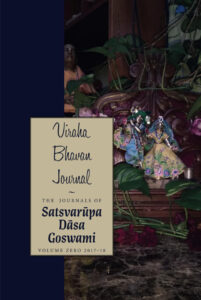
Viraha Bhavan Journal (2017–2018) was written by Satsvarūpa Mahārāja following a brief hiatus in writing activity, and was originally intended to be volume 1 in a series of published journals. However, following its completion and publication, Mahārāja again stopped writing books, subsequently focusing only on what became his current online journal, which began in August of 2018.

At first, I took it hard that I would have to live surrounded by the firemen, and without my own solitude. After all, for decades I had lived in my own house with my own books and my own friends. I was also now a crippled person who couldn’t walk, living among men who did active duties. But when Baladeva explained it to me, how it was not so bad living continually with other firemen and living in the firehouse with its limited facilities, I came to partially accept it and to accept the other men. I came to accept my new situation. I would live continually in the firehouse and mostly not go outside. I would not lead such a solitary life but associate with the other firemen.
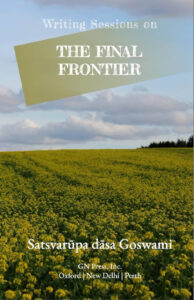
Let me write sweet prose.
Let me write not for my own benefit
but for the pleasure of Their Lordships.
Let me please Kṛṣṇa,
that’s my only wish.
May Kṛṣṇa be pleased with me,
that’s my only hope and desire.
May Kṛṣṇa give me His blessings:
Kṛṣṇa Kṛṣṇa Kṛṣṇa Kṛṣṇa Kṛṣṇa he
Rāma Rāghava Rāma Rāghava
Rāma Rāghava rakṣa mām.
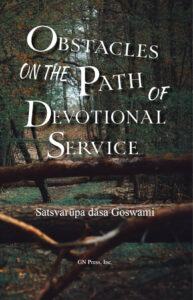
You mentioned that your pathway has become filled with stumbling blocks, but there are no stumbling blocks. I can kick out all those stumbling blocks immediately, provided you accept my guidance. With one stroke of my kick, I can kick out all stumbling blocks. —Letter by Śrīla Prabhupāda, December 9, 1972.
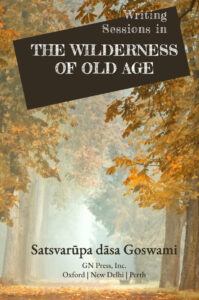
The Writing Sessions are my heart and soul. I’m trying my best to keep up with them. I am working with a few devotees, and they are far ahead of me. I wander in the wilderness of old age. I make my Writing Sessions as best I can. Every day I try to come up with a new subject. Today I am thinking of my parents. But I don’t think of them deeply. They are long gone from my life. Śrīla Prabhupāda wrote a poem when he was a sannyāsī, and he said now all my friends and relatives are gone. They are just a list of names now. I am like that too. I am a sannyāsī with a few friends. I love the books of Śrīla Prabhupāda. I try to keep up with them. I read as much as I can and then listen to his bhajanas.
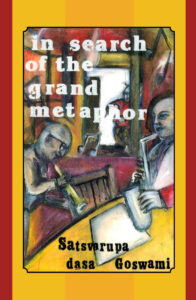
The metaphor is song. Explain it. Yes, particulars may not seem interesting or profound to readers who want structured books.
Wait a minute. Don’t pander to readers or concepts of Art. But Kṛṣṇa conscious criteria are important and must be followed. So, if your little splayed-out life-thoughts are all Kṛṣṇa conscious, then it’s no problem.
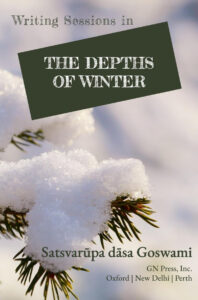
I am near the end of my days. But I do like the company of like-minded souls, especially those who are Kṛṣṇa conscious. Yes! I am prone to Kṛṣṇa consciousness. I have been a disciple of Bhaktivedanta Swami Prabhupāda for maybe almost sixty years. Sometimes I fail him. But I always bounce back and fall at his feet. It is a terrible thing that I sometimes do not have the highest love for him. It is a terrible thing. Actually, however, I never fall away from him. He always comes and catches me and brings me back to his loving arms.

This edition of Satsvarūpa dāsa Goswami’s 1996 timed book, Upstate: Room to Write, is published as part of a legacy project to restore Satsvarūpa Mahārāja’s writings to ‘in print’ status and make them globally available for current and future readers.
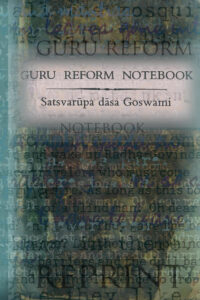
A factual record of the reform and change in ISKCON guru system of mid ’80s.

Readers will find, in the Appendix of this book, scans of a cover letter written by Satsvarūpa Mahārāja to the GN Press typist at the time, along with some of the original handwritten pages of June Bug. Together, these help to illustrate the process used by Mahārāja when writing his books during this period. These were timed books, in the sense that a distinct time period was allotted for the writing, during SDG’s travels as a visiting sannyāsī
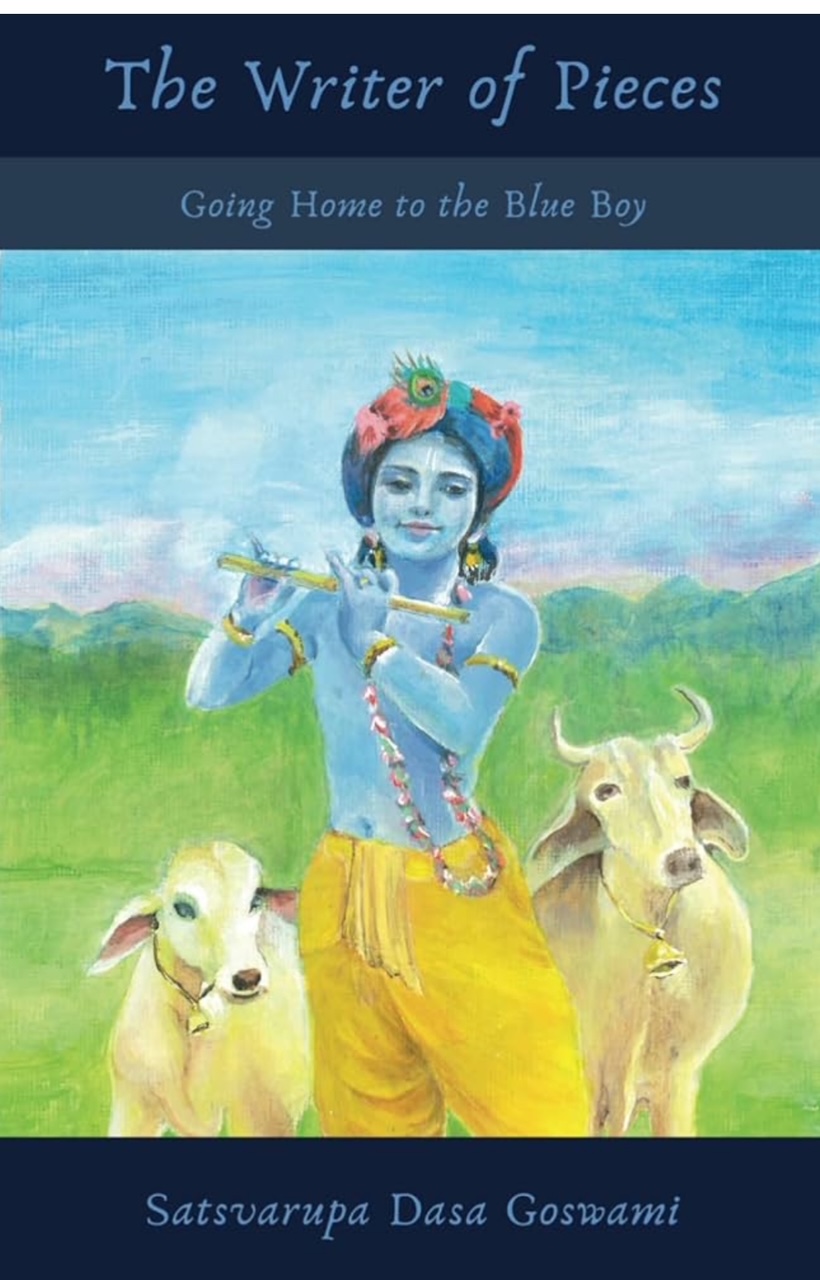
Don’t take my pieces away from me. I need them dearly. My pieces are my prayers to Kṛṣṇa. He wants me to have them, this is my way to love Him. Never take my pieces away.
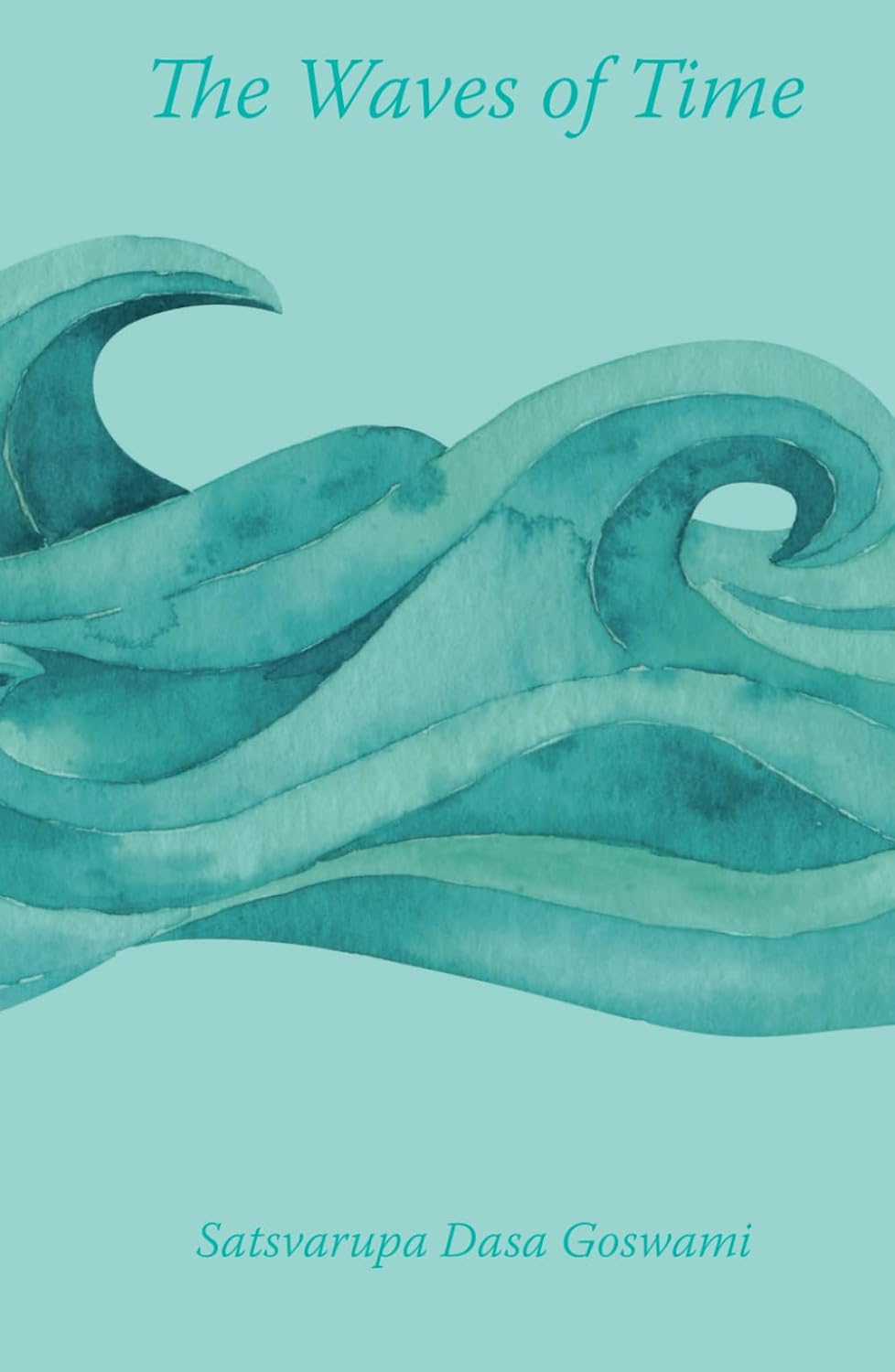
Many planks and sticks, unable to stay together, are carried away by the force of a river’s waves. Similarly, although we are intimately related with friends and family members, we are unable to stay together because of our varied past deeds and the waves of time.

To Śrīla Prabhupāda, who encouraged his devotees (including me) To write articles and books about Kṛṣṇa Consciousness.
I wrote him personally and asked if it was alright for his disciples to write books, Since he, our spiritual master, was already doing that. He wrote back and said that it was certainly alright For us to produce books.

I have a personal story to tell. It is a about a time (January–July 1974) I spent as a personal servant and secretary of my spiritual master, His Divine Grace A.C. Bhaktivedanta Swami Prabhupäda, founder-äcärya of the International Society for Krishna Consciousness. Although I have written extensively about Çréla Prabhupäda, I’ve hesitated to give this account, for fear it would expose me as a poor disciple. But now I’m going ahead, confident that the truth will purify both my readers and myself.

First published by The Gītā-nāgarī Press/GN Press in serialized form in the magazine Among Friends between 1996 and 2001, Best Use of a Bad Bargain is collected here for the first time in this new edition. This volume also contains essays written by Satsvarūpa dāsa Goswami for the occasional periodical, Hope This Meets You in Good Health, between 1994 and 2002, published by the ISKCON Health and Welfare Ministry.

This book has two purposes: to arouse our transcendental feelings of separation from a great personality, Śrīla Prabhupāda, and to encourage all sincere seekers of the Absolute Truth to go forward like an army under the banner of His Divine Grace A.C. Bhaktivedanta Swami Prabhupāda and the Kṛṣṇa consciousness movement.

A single volume collection of the Nimai novels.

Śrīla Prabhupāda was in the disciplic succession from the Brahmā-Mādhva-Gauḍīya sampradāya, the Vaiṣṇavas who advocate pure devotion to God and who understand Kṛṣṇa as the Supreme Personality of Godhead. He always described himself as simply a messenger who carried the paramparā teachings of his spiritual master and Lord Kṛṣṇa.

Dear Srila Prabhupada,
Please accept this or it’s worse than useless.
You have given me spiritual life
and so my time is yours.
You want me to be happy in Krishna consciousness
You want me to spread Krishna consciousness,

This collection of Satsvarūpa dāsa Goswami’s writings is comprised of essays that were originally published in Back to Godhead magazine between 1966 and 1978, and compiled in 1979 by Gita Nagari Press as the volume A Handbook for Kṛṣṇa Consciousness.

This second volume of Satsvarūpa dāsa Goswami’s Back to Godhead essays encompasses the last 11 years of his 20-year tenure as Editor-in-Chief of Back to Godhead magazine. The essays in this book consist mostly of SDG’s ‘Notes from the Editor’ column, which was typically featured towards the end of each issue starting in 1978 and running until Mahārāja retired from his duties as editor in 1989.

This collection of Satsvarupa dasa Goswami’s writings is comprised of essays that were originally published in Back to Godhead magazine between 1991 and 2002, picking up where Volume 2 leaves off. The volume is supplemented by essays about devotional service from issues of Satsvarupa dasa Goswami’s magazine, Among Friends, published in the 1990s.

“This is a different kind of book, written in my old age, observing Kṛṣṇa consciousness and assessing myself. I believe it fits under the category of ‘Literature in pursuance of the Vedic version.’ It is autobiography, from a Western-raised man, who has been transformed into a devotee of Kṛṣṇa by Śrīla Prabhupāda.”
 The Best I Could Do
The Best I Could DoI want to study this evolution of my art, my writing. I want to see what changed from the book In Search of the Grand Metaphor to the next book, The Last Days of the Year.
 a Hare Krishna Man
a Hare Krishna ManIt’s world enlightenment day
And devotees are giving out books
By milk of kindness, read one page
And your life can become perfect.
 Calling Out to Srila Prabhupada: Poems and Prayers
Calling Out to Srila Prabhupada: Poems and PrayersO Prabhupāda, whose purports are wonderfully clear, having been gathered from what was taught by the previous ācāryas and made all new; O Prabhupāda, who is always sober to expose the material illusion and blissful in knowledge of Kṛṣṇa, may we carefully read your Bhaktivedanta purports.

I use free-writing in my devotional service as part of my sādhana. It is a way for me to enter those realms of myself where only honesty matters; free-writing enables me to reach deeper levels of realization by my repeated attempt to “tell the truth quickly.” Free-writing takes me past polished prose. It takes me past literary effect. It takes me past the need to present something and allows me to just get down and say it. From the viewpoint of a writer, this dropping of all pretense is desirable.
 Geaglum Free Write
Geaglum Free WriteThis edition of Satsvarūpa dāsa Goswami’s 1996 timed book, Geaglum Free Write Diary, is published as part of a legacy project to restore Satsvarūpa Mahārāja’s writings to ‘in print’ status and make them globally available for current and future readers.